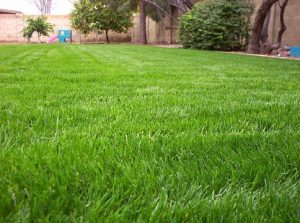Although not a panacea for lawncare issues, Bermudagrass is a hardy turf option, tough enough to handle lots of foot traffic and horsing around (no pun intended). Because of its tough-enough reputation, Bermudagrass is the species of choice for many sports facilities including golf-courses and ball-fields. It also has the advantage of being able to establish from seed. One of the disadvantages of Bermudagrass however, is that it grows aggressively so its stolons can easily invade plant beds and other landscape areas.
Mowing
Depending on the variety of Bermudagrass, the recommended mowing height ranges from 0.5 to 2 inches. Popular choices for lawns include ‘Celebration’ and ‘Sultan’. Although fairly drought tolerant, adherence to recommended mowing heights improves Bermudagrass’ drought tolerance, and makes it less susceptible to damage from pests and diseases including mole crickets and large-patch.
Irrigation
During dry weather, Bermudagrass enters a drought-induced dormancy and will turn brown, but will resume growth and green-up once irrigation/rainfall becomes available. The ideal irrigation recommendation for Bermudagrass is a rate of 0.5 to 0.75 inch of water per application, as water applied in excess of this can contribute to nutrient leaching and development of fungal diseases. To learn more about calculating irrigation application rates click on this link.
Fertilizers
Adherence to recommended fertilizer requirements for Bermudagrass supports healthy turf, which is less susceptible to pest and disease damage, and can crowd out weeds. To learn more about appropriate turf fertilizer recommendations and controlling weeds, click on the links below.
Dormancy
Bermudagrass can go dormant when temperatures drop in cooler weather, but there are many cold-tolerant varieties which hold their color during prolonged periods of low temperatures. To learn more about turf dormancy click this link.
Click on this link to learn more about fool-proofing your Bermudagrass lawn.
 0
0


